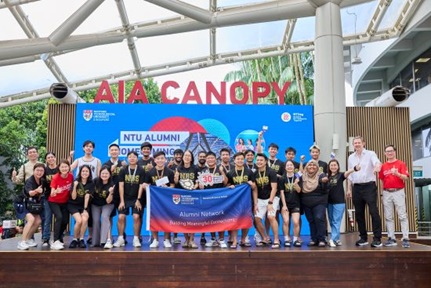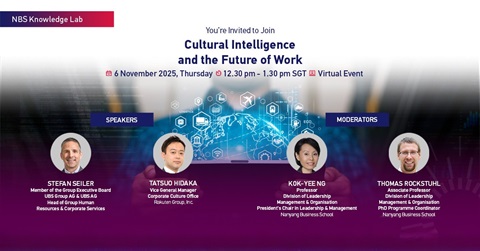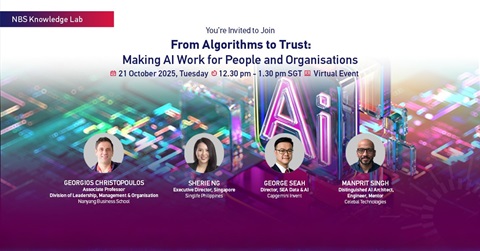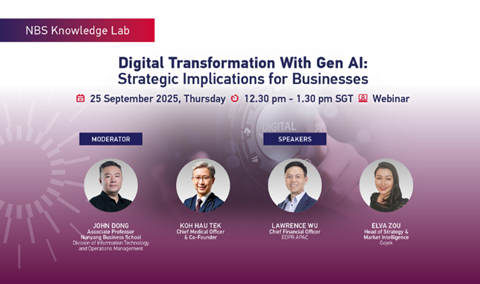Leadership Challenges during the Pandemic
NBS Knowledge Lab: Dean’s Distinguished Speaker Series with Nicole Tan, President & CEO Asia Pacific, Shiseido. She shares her insights into the dynamics of the global beauty industry and leadership success factors in this time of change
The 2021 edition of the NBS Knowledge Lab Dean’s Distinguished Speaker Series welcomed Nicole Tan, President & CEO Asia Pacific of Shiseido, to share her perspectives on strategic leadership in turbulent times in the beauty industry.
The session, which was moderated by Professor Christina Soh, Dean of Nanyang Business School, was held in a hybrid format, with a small ‘live’ audience on campus at Nanyang Technological University, Singapore and a larger group of attendees joining online.
As the first female Asia Pacific President and CEO at Shiseido, Nicole is perfectly positioned to share her experience and insights into the dynamic beauty industry. Beginning the session with a brief introduction of her career path, Nicole advised young job seekers to find passion in what they do and not be afraid of taking challenges. Being proactive is an important part of taking charge of your career.

President & CEO Asia Pacific of Shiseido, Nicole giving her speech during the session
The beauty industry today
Beauty, highlighted Nicole, is an especially resilient industry that has the ability to pivot quickly in the face of consumer and economic trends, such as personalisation, inclusivity, and authenticity. While these trends are not new, what is new is how companies embed changes into their business model for more personalised messaging to consumers.
Inclusivity, Nicole stressed, is not just about make-up foundation shades – it is knowing that a standard view to beauty does not exist. The concept of inclusivity also means providing more options to a wider range of consumers such as developing products that cater to men or made with halal certified ingredients. Lastly, authenticity is linked to community – where consumers today want to connect with like-minded individuals.
Referring to the global beauty market size forecast, Nicole shared that prestige brands are predicted to make up 57 percent of the market by 2030, and Shiseido’s current strategy to focus on prestige skin care rides on this particular wave.
Brands like Drunk Elephant, a millennial prestige clean beauty brand that Shiseido has acquired, are driven by community and word-of-mouth rather than paid advertising. They have gained increasing consumer appreciation and a strong following.
Pandemic-fuelled trends
COVID-19 has affected some trends in the industry, such as the increased usage of DIY home kits (e.g., hair dyes and nail treatment), home-based gadgets (e.g., LED masks, massage tools) and multifunctional products. Ingestibles and supplements have also been a vast driver in 2020. Nicole sees a blurring of lines between product, nutrition, and gadget-based companies in the future.
Additionally, pre-pandemic interest in lip products has dropped as consumers spend more time at home and/or with masks on. Meanwhile, masking up has led to a renewed interest in skincare as wearing masks causes a variety of skin problems.
Fragrance is also currently in demand, especially lifestyle category products like home fragrances and diffusers.
Nicole shared the importance of research and innovation in keeping up with these trends as more tests are done to look at the impact of different formulas on different skin types and skin tones, or to investigate how the human skin evolves at the cellular level. More resources have also been invested into packaging and material design, factory water usage, as well as production techniques, to ensure they are in line with the company’s sustainability goals.
Digital disruptions
Like many industries, the beauty business has been experiencing digital disruptions in recent years. For example, ecommerce now plays a bigger role than before in prestige and luxury brands because technology today offers improved shopping experience amidst changing consumer purchasing habits.
Livestreaming is another marketing channel that offers an interactive experience for consumers while apps like TikTok provide platforms for content exchange. Nicole, however, warned that, for brands to be relevant on such platforms, they need to find their own voice and positioning. Social commerce (ecommerce in the social digital space) will continue tapping into consumers’ sense of impulse and instant gratification, thereby redefining retail.
But Nicole is confident that brick and mortar business models will continue to coexist with online businesses. To succeed, the key is to provide a seamless link between offline and online consumer experience, which would require an integrated workflow within the firm.
Ending her presentation with insights into leadership during turbulent times, Nicole stressed the importance of leading with empathy and compassion, providing authentic and frequent communication, being clear in strategy and KPIs, enabling trust, and encouraging unity.
Q&A Session

NBS Dean, Prof Soh and Nicole addressing questions from audience during Q&A
Many questions came in during the Q&A session. Here we highlight a few:
During the Q&A, participants were interested in knowing how Shiseido caters to consumers in the halal and male market. Nicole explained that providing halal products is a complex process as special care would have to be taken with the manufacturing and ingredients used. This would be a multi-year effort as there is no standard halal certificate across the board for beauty products. Nicole also shared that Shiseido offers a range of products catered to men.
On omnichannel and counterfeiting, Nicole stressed that while omnichannel is an inevitable part of the business, for this to work, firms need to understand who their consumers are. This requires data from direct consumer interactions and/or retail collaborations.
In Singapore or any open market, there’s a limit to what firms can do regarding counterfeiting. Ultimately, the consumer decides what and who they want to purchase from, and brands can only do their best to present themselves in the best possible image. The Shiseido flagship store on Lazada, for instance, provides product guarantees and a completely different experience from other stores.
On her thoughts regarding influencer-born brands and conglomerates buying over brands to tap into the influencer’s community, Nicole said that it all depends on the firms’ assessment of the longevity of the influencer and whether the influencer’s values are aligned with the conglomerate’s. Alternatively, conglomerates could incubate their own brands but this would take a lot of time in comparison.
Finally, Nicole’s advice to mid-career individuals looking to grow in the beauty industry is for them to first determine the next milestone they want to reach, be it opportunities from a geographical, brand, or competency standpoint. They also need to decide if they intend to stay in the industry. If so, there are skill sets that one would need to develop to get to certain roles. Hence, looking at role models in the industry would be helpful in determining the next course of action.


.tmb-listing.png?Culture=en&sfvrsn=d48abb4_1)




